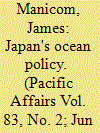| Srl | Item |
| 1 |
ID:
192958


|
|
|
|
|
| Summary/Abstract |
After decades of international cooperative strategies based on soft power through Official Development Assistance (ODA), the environmental, socioeconomic, and political change in the circumpolar North has led Japan to develop and link its Arctic policy with its Oceanic policy. To respond to the rising influence of China in the geopolitical and geoeconomic scene, Japan's maritime policy is based on international peace and stability, freedom of navigation, and the support of the international legal framework. Beyond its regional sphere of interest and influence, the inclusion of the Arctic region in Japan's Oceanic policy is also strongly connected to the influence of think tanks, lobbies, and institutions in Japan's policies, that for decades have encouraged Tokyo to take proactive measures. This policy also illustrates the ambition to present a comprehensive panoramic strategy embracing not only seas and oceans directly surrounding Japan, but worldwide.
|
|
|
|
|
|
|
|
|
|
|
|
|
|
|
|
| 2 |
ID:
157806


|
|
|
|
|
| Summary/Abstract |
On February 20, 2017, Indonesian President Joko Widodo signed Presidential Regulation no. 16 on the “Indonesian Ocean Policy”. The national policy was issued as the guideline for, and to coordinate, all maritime-related policies and programmes across different ministries and agencies. Prior to this, Indonesia was long criticised for lacking an integrated ocean policy and ocean-based strategies. Aside from domestic urgency, the narrative through which the new policy is introduced portrays a strategic document that projects Indonesia's interest and strategy in the region, and globally. Emphasising these two dimensions of the policy (domestic and external), this paper argues that on the domestic front the policy document has a clear elaboration of the important aspects of ocean management, and functions appropriately in its aim to coordinate maritime-related policies. On the other hand, the external dimension of the ocean policy is still unclear, particularly in terms of how this document will interact with and affect regional geopolitics.
|
|
|
|
|
|
|
|
|
|
|
|
|
|
|
|
| 3 |
ID:
098458


|
|
|
|
|
| Publication |
2010.
|
| Summary/Abstract |
In 2005-2006 Japan began asserting the jurisdictional rights to its maritime domain with greater authority than ever before. Tokyo prepared to conduct exploratory drilling in the disputed East China Sea and passed new laws to permit the full realization of Japan's maritime rights and responsibilities. This activist turn appears to be at odds with most explanations of Japanese strategic policy. Given its preference for strategic evolution, Japan's sudden preoccupation with the security and administration of its extended maritime zones-the Exclusive Economic Zone (EEZ) and its extended continental shelf-following years of neglect is striking. Moreover, this shift has not received a great deal of attention in the literature. This paper argues that Japan's hesitant, ad hoc and incomplete response to its changing maritime environment can be understood through Kent Calder's "reactive state" paradigm. While academic discussion of Japanese foreign policy has moved beyond the reactive state debate, Japan's approach to its ocean policy appears to fulfill both of Kent Calder's reactive state criteria. This paper analyses Japan's resistance to the expansion of state sovereignty seaward and explores how this policy inertia was exposed by China's more active maritime policy. This more assertive Chinese posture triggered the proactive turn in Japan's ocean policy, which may have negative consequences for regional security.
|
|
|
|
|
|
|
|
|
|
|
|
|
|
|
|
| 4 |
ID:
063488


|
|
|